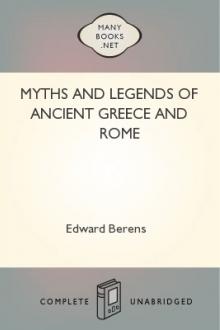Myths and Legends of Ancient Greece and Rome by E. M. Berens (best romantic novels in english txt) 📕

- Author: E. M. Berens
- Performer: -
Book online «Myths and Legends of Ancient Greece and Rome by E. M. Berens (best romantic novels in english txt) 📕». Author E. M. Berens
EUROPA was the beautiful daughter of Agenor, king of Phœnicia. She was one day gathering flowers with her companions in a meadow near the sea-shore, when Zeus, charmed with her great beauty, and wishing to win her love, transformed himself into a beautiful white bull, and trotted quietly up to the princess, so as not to alarm her. Surprised at the gentleness of the animal, and admiring its beauty, as it lay placidly on the grass, she caressed it, crowned it with flowers, and, at last, playfully seated herself on its back. Hardly had she done so than the disguised god bounded away with his lovely burden, and swam across the sea with her to the island of Crete.
Europa was the mother of Minos, Aeacus, and Rhadamanthus. Minos, who became king of Crete, was celebrated for his justice and moderation, and after death he was created one of the judges of the lower world, which office he held in conjunction with his brothers.
CALLISTO, the daughter of Lycaon, king of Arcadia, was a huntress in the train of Artemis, devoted to the pleasures of the chase, who had made a vow never to marry; but Zeus, under the form of the huntress-goddess, succeeded in obtaining her affections. Hera, being extremely jealous of her, changed her into a bear, and caused Artemis (who failed to recognize her attendant under this form) to hunt her in the chase, and put an end to her existence. After her death she was placed by Zeus among the stars as a constellation, under the name of Arctos, or the bear.
ALCMENE, the daughter of Electryon, king of Mycenae, was betrothed to her cousin Amphytrion; but, during his absence on a perilous undertaking, Zeus assumed his form, and obtained her affections. Heracles (whose world-renowned exploits will be related among the legends) was the son of Alcmene and Zeus.
SEMELE, a beautiful princess, the daughter of Cadmus, king of Phœnicia, was greatly beloved by Zeus. Like the unfortunate Callisto, she was hated by Hera with jealous malignity, and the haughty queen of heaven determined to effect her destruction. Disguising herself, therefore, as Berœ, Semele's faithful old nurse, she artfully persuaded her to insist upon Zeus visiting her, as he appeared to Hera, in all his power and glory, well knowing that this would cause her instant death. Semele, suspecting no treachery, followed the advice of her supposed nurse; and the next time Zeus came to her, she earnestly entreated him to grant the favour she was about to ask. Zeus swore by the Styx (which was to the gods an irrevocable oath) to accede to her request whatsoever it might be. Semele, therefore, secure of gaining her petition, begged of Zeus to appear to her in all the glory of his divine power and majesty. As he had sworn to grant whatever she asked of him, he was compelled to comply with her wish; he therefore revealed himself as the mighty lord of the universe, accompanied by thunder and lightning, and she was instantly consumed in the flames.
IO, daughter of Inachus, king of Argos, was a priestess of Hera. She was very beautiful, and Zeus, who was much attached to her, transformed her into a white cow, in order to defeat the jealous intrigues of Hera, who, however, was not to be deceived. Aware of the stratagem, she contrived to obtain the animal from Zeus, and placed her under the watchful care of a man called Argus-Panoptes, who fastened her to an olive-tree in the grove of Hera. He had a hundred eyes, of which, when asleep, he never closed more than two at a time; being thus always on the watch, Hera found him extremely useful in keeping guard over Io. Hermes, however, by the command of Zeus, succeeded in putting all his eyes to sleep with the sound of his magic lyre, and then, taking advantage of his helpless condition, slew him. The story goes, that in commemoration of the services which Argus had rendered her, Hera placed his eyes on the tail of a peacock, as a lasting memorial of her gratitude. Ever fertile in resource, Hera now sent a gadfly to worry and torment the unfortunate Io incessantly, and she wandered all over the world in hopes of escaping from her tormentor. At length she reached Egypt, where she found rest and freedom from the persecutions of her enemy. On the banks of the Nile she resumed her original form and gave birth to a son called Epaphus, who afterwards became king of Egypt, and built the famous city of Memphis.
DANAE.—Zeus appeared to Danae under the form of a shower of gold. (Further details concerning her will be found in the legend of Perseus.)
The Greeks supposed that the divine ruler of the Universe occasionally assumed a human form, and descended from his celestial abode, in order to visit mankind and observe their proceedings, his aim being generally either to punish the guilty, or to reward the deserving.
On one occasion Zeus, accompanied by Hermes, made a journey through Phrygia, seeking hospitality and shelter wherever they went. But nowhere did they receive a kindly welcome till they came to the humble cottage of an old man and his wife called Philemon and Baucis, who entertained them with the greatest kindness, setting before them what frugal fare their humble means permitted, and bidding them welcome with unaffected cordiality. Observing in the course of their simple repast that the wine bowl was miraculously replenished, the aged couple became convinced of the divine nature of their guests. The gods now informed them that on account of its wickedness their native place was doomed to destruction, and told them to climb the neighbouring hill with them, which overlooked the village where they dwelt. What was their dismay on beholding at their feet, in place of the spot where they had passed so many happy years together, nothing but a watery plain, the only house to be seen being their own little cottage, which suddenly changed itself into a temple before their eyes. Zeus now asked the worthy pair to name any wish they particularly desired and it should be granted. They accordingly begged that they might serve the gods in the temple below, and end life together.
Their wish was granted, for, after spending the remainder of their lives in the worship of the gods, they both died at the same instant, and were transformed by Zeus into trees, remaining for ever side by side.
Upon another occasion Zeus, wishing to ascertain for himself the truth of the reports concerning the atrocious wickedness of mankind, made a journey through Arcadia. Being recognized by the Arcadians as king of heaven, he was received by them with becoming respect and veneration; but Lycaon, their king, who had rendered himself infamous by the gross impiety of himself and his sons, doubted the divinity of Zeus, ridiculed his people for being so easily duped, and, according to his custom of killing all strangers who ventured to trust his hospitality, resolved to murder him. Before executing this wicked design, however, he decided to put Zeus to the test, and having killed a boy for the purpose, placed before him a dish containing human flesh. But Zeus was not to be deceived. He beheld the revolting dish with horror and loathing, and angrily upsetting the table upon which it was placed, turned Lycaon into a wolf, and destroyed all his fifty sons by lightning, except Nyctimus, who was saved by the intervention of Gæa.
JUPITER.
The Roman Jupiter, who is so frequently confounded with the Greek Zeus, is identical with him only as being the head of the Olympic gods, and the presiding deity over Life, Light, and Aërial Phenomena. Jupiter is lord of life in its widest and most comprehensive signification, having absolute power over life and death, in which respect he differed from the Greek Zeus, who was to a certain extent controlled by the all-potent sway of the Moiræ or Fates. Zeus, as we have seen, often condescends to visit mankind, either as a mortal, or under various disguises, whereas Jupiter always remains essentially the supreme god of heaven, and never appears upon earth.
The most celebrated temple of Jupiter was that on the Capitoline Hill in the city of Rome, where he was worshipped under the names of Jupiter-Optimus-Maximus, Capitolinus, and Tarpeius.
The Romans represented him seated on a throne of ivory, holding in his right hand a sheaf of thunderbolts, and in his left a sceptre, whilst an eagle stands beside his throne.
HERA (Juno).Hera, the eldest daughter of Cronus and Rhea, was born at Samos, or, according to some accounts, at Argos, and was reared by the sea-divinities Oceanus and Tethys, who were models of conjugal fidelity.[16] She was the principal wife of Zeus, and, as queen of heaven, participated in the honours paid to him, but her dominion only extended over the air (the lower aërial regions). Hera appears to be the sublime embodiment of strict matronly virtue, and is on that account the protectress of purity and married women. Faultless herself in her fidelity as a wife, she is essentially the type of the sanctity of the marriage tie, and holds in abhorrence any violation of its obligations. So strongly was she imbued with this hatred of any immorality, that, finding herself so often called upon to punish the failings of both gods and men in this respect, she became jealous, harsh, and vindictive. Her exalted position as the wife of the supreme deity, combined with her extreme beauty, caused her to become exceedingly vain, and she consequently resented with great severity any infringement on her rights as queen of heaven, or any apparent slight on her personal appearance.
The following story will signally illustrate how ready she was to resent any slight offered to her.
At the marriage of the sea-nymph Thetis with a mortal called Peleus, all the gods and goddesses were present, except Eris (the goddess of Discord). Indignant at not being invited, she determined to cause dissension in the assembly, and for this purpose threw into the midst of the guests a golden apple with the inscription on it "For the Fairest." Now, as all the goddesses were extremely beautiful, each claimed the apple; but at length, the rest having relinquished their pretensions, the number of candidates was reduced to three, Hera, Athene, and Aphrodite, who agreed to appeal to Paris for a settlement of this delicate question, he being noted for the wisdom he had displayed in his judgment upon several occasions. Paris was the son of Priam, king of Troy, who, ignorant of his noble birth, was at this time feeding his flocks on Mount Ida, in Phrygia. Hermes, as messenger of the gods, conducted the three rival beauties to the young shepherd, and with breathless anxiety they awaited





Comments (0)